Last fall, Nina Burleigh visited her cousins in Baghdad in hopes of better understanding Iraqis' love-hate relationship with America. Weeks later, as the bombs began to drop, her own loyalties went to war -- Mirabella, March 1999.
**************
My first night in the Middle East, I feel as if I'm falling asleep on the dark side of the moon. There is a smoky kerosene smell and a mullah calling "Allah akbar" (God is great) from the neon green rim of a minaret. My flesh will take days to arrive in this time zone.
It's three in the morning and I'm in Jordan, in a one star hotel called the Cleopatra, a warren of rooms up three flights of narrow marble steps. A pink worm is writhing on the bathroom floor, and the night clerk has just called to ask if I need a massage. The Cleopatra is next to the Amman bus depot, a way station for Third World travelers with little money and often nothing left to sell but themselves. In the hotel lobby the next morning, I meet an Iraqi woman named Salamiya. Her hair is bleached to a brassy nest and she wears a tight sheath and green nail polish, her chubby feet stuffed into stilettos.
She was sold by her parents to a Saudi man for $5,000 a few years ago. She works at the nightclubs now. She wants to get back into Iraq.
So do I. Iraq is the enemy of my country and the country of my mother. I'm a half-breed, as Cher used to wail back in the 70's. My parents are a blue-eyed man with an Anglo-Saxon name and a black-haired woman with a foreign accent. Usually this mixed pedigree goes unnoticed, but in Louisiana, reporting on David Duke a few years ago, I stopped at a country gas station to ask directions to one of his rallies. "Why do you want to go there?" one of the guys behind the counter asked in friendly wonderment. "You look like a sand niggah to me."
Since the Gulf War, I've made three trips to Iraq, all of them as a journalist because that's one of the few legal ways to get into the country. Before I leave for my latest visit, in mid-September, I meet with a representative of UNSCOM, the weapons inspectors who have been trying to locate Iraq's nerve gas, anthrax, and botulism. The UNSCOM man explains that Saddam Hussein has been hiding his weapons in a complicated shell game, and since the inspectors were about to uncover his stash, he shut the whole operation down. (The next time Saddam failed to provide access to weapons sites, he precipitated the pre- Christmas bombing raid by the United States and Great Britain.)
I also speak with acting UN ambassador A. Peter Burleigh (no relation, though he does resemble an uncanny resemblance to my father). Burleigh admits the sanctions are imperfect and that many countries within the UN oppose them, but the United States opposes any easing without Saddam's relenting on the weapons front.
I leave for Iraq with the same set of conflicting emotions I packed with me on previous trips. I am repelled by the Iraqi government, but I am not convinced that the people should be made to suffer for the policies of a leader they didn't even elect. The Baath Party seized power in 1968 after a series of bloody coups (by coincidence, I was an eight-year-old girl visiting my grandmother in Iraq at the time), and Saddam took over in 1979. While the regime nationalized oil, and the dedicated some of the proceeds to improving education and the infrastructure, it has been notoriously brutal in repressing dissent. Since the Gulf War, I have read the news of waxing and waning crises over Baghdad with profound sorrow as well as frustration. By virtue of my bloodline, I feel I must know something I should try to communicate to other Americans. I've felt restricted by the rules of my job as an unsentimental skeptic; by the war propaganda of the United States; by the limits the Iraqi government puts on journalists; and, most of all, by the Iraqi people's fear of speaking openly.
On this trip, I decide to visit my own relatives in hopes of unlocking some door to understanding.
The only way to get to Baghdad in sanctions-era Iraq is to rent a car or truck in Amman and drive. For fifteen hours there is only treeless dirt, a crust of earth floating on an ocean of oil. There is so much oil under Iraq that at prewar pumping rates, it won't run out until well into the third millennium.
As an American entering totalitarian Iraq, each border crossing has provoked in me a counterintuitive surge of personal liberation and power. Flipping my passport onto the greasy desk of a condescending bureaucrat reminds me that I'm in fact "Burleigh," born in the land of the free and--in Iraq if not always at home--a fully accredited member of the victorious nation. By an accident of birth I'm not subject to Saddam Hussein's regime, represented by the Baath Party's green star, stenciled on everything that doesn't already have Saddam's portrait on it.
I share the car with members of a group called Voices in the Wilderness, Americans who risk prison and fines to enter Iraq in defiance of a U.S. State Department travel ban. They visit hospitals to deliver toys and small amounts of medicine--and photograph malnourished children to illustrate the effects of eight years of sanctions.
People in Iraq are suffering. The UN concedes that five thousand children per month are starving to death, and the professional class has been destroyed by the collapse of the currency. But weird rumors abound in this isolated country where information is controlled by the government, and Voices in the Wilderness members are too willing to believe them. My fellow travelers insist that uranium shells used in the war have caused leukemia and birth defects--possible, but there are no medical studies to confirm that. They also pass around demonstrably false tales: Schoolchildren's pencils are banned under the UN sanctions as a "dual use" item, meaning they can be used as weapons; ditto for chlorine, essential for purifying water; a killer worm dropped on Iraq by the U.S. is eating children's brains. I see pencils; UNICEF officials say chlorine is available; and, as for the killer worms. . .
Two of the four Voices representatives have never been out of the United States before and began fasting to protest the sanctions a month before the trip. One, a pallid college student who carries a backpack decorated with antinuke buttons, will later almost pass out while visiting a hospital, overcome by hunger, heat, and the sight of infants with deformities that the Iraqis blame on the Gulf War. He and the others are compassionate, but their refusal to acknowledge anything but American violence seems terribly naïve. Were they Iraqis and the situation reversed, they wouldn't make it to the border of their own country without being shot. Dissent here is punishable by death.
Green specks of vegetation mark the approach to the oasis that is Baghdad. Near the city, the heat increases exponentially; the air outside feels like the inside of a pizza oven. Built by the caliphs on the Tigris River 1,200 years ago. Baghdad is bathed in yellow twilight, the color of evening in Iraq. Neon signs and pedestrians and date trees are ghostly in the gathering dusk.
The hotel where we stay overlooks the date-tree-lined banks of the Tigris River. After dark, packs of wild dogs, the offspring of pets nobody could feed, emerge from the riverbank and hunt. Disco music blares from the high-rise hotel across the street. The same tape with Cyndi Lauper, Tina Turner, and the Eagles replays until three A.M.
Iraq is saturated with our culture. The state television broadcasts bootleg videos while films are still in American theaters, so Iraqi children have all seen Titanic and Godzilla; rich kids even have Leo DiCaprio T-shirts. For adults, the United States provides another sort of entertainment. One night I find a group of men gathered around the TV in the hotel lobby, watching President Clinton, I stand a minute in the smoke of their cheap cigarettes before realizing they're watching his just-released grand jury testimony--already dubbed into Arabic.
At the Iraqi Women's Federation, a bureaucracy of Saddam's cheerleaders, as it were (where I go on a failed mission to try to confirm reports that growing numbers of Iraqi women are turning to prostitution), the front door is decorated with "Down with America," in Arabic. But during one of my visits, the secretaries and clerks, shy women dressed for some reason in party clothes (one even wears a rhinestone tiara), crowd into the room to share celebrity gossip and ask about current fashions. I only realize how truly isolated they are when one asks whether Princess Caroline of Monaco has her hair back.
Iraqi's widespread awareness of Western culture and internal American politics makes their submission to Saddam's regime that much more puzzling. How can they not fight for freedoms they know exist elsewhere? What would it take to make these people rise up?
Iraqi is full of people who will look you in the eye and tell you what a great guy Saddam is. Some of them appear to mean it, too. They're the ones who've benefited from his long rule and continue to receive rewards--including the right to associate with Westerners and, if they can find one who needs some help, get paid in American dollars.
My third day in Iraq, I hire a translator through the Information Ministry. Mariam comes from a prominent family, so prominent she refuses to give her last name--aristocrats aren't supposed to have to work for a living. Over tea, her blue eyes fill with tears as she ticks off Saddam's acts of kindness. He sent her a Patek Philippe watch after she wrote a story he liked, and later he sent her several large screen TVs. "Americans do not understand how generous he is," she says. "He used to walk in the streets and talk to the people. His phone number was in the book; anyone could call him. He paid for surgery for the poor! He bought people houses! He was so generous." She shakes her head. "And now he must hide because the Americans want to kill him."
She refers only obliquely to the terror under which Iraqis live. She tells me that to associate with Iraqis on my own could get them into trouble. That may be true in some circumstances, but I suspect that the warning is most frequently issued by people like Mariam, who wish to earn hard currency from frightened Westerners.
My visits to my cousins' house, on a middle-class Baghdad street a few miles from UN headquarters, are inchoate affairs. I can't speak their language and they barely speak mine. The family--my mother's cousin, partially paralyzed by a stroke, and his wife; their son, who's ten years younger than I but looks ten years older, his wife and three young daughters--aren't starving. But none of them have jobs. They're supported by a brother in Sweden who's a doctor. They're not the kind of Iraqis who get gifts from the president.
As I sit in the quiet of their walled garden, they bring out glasses of an orange drink on a tray and show me old family photos. I am transfixed by a picture of the grandfather who died before I was born, receiving a handshake and a gift from a ruddy British corporate type for his lifetime of service to the Iraq Petroleum Company. I.P.C. was the multinational that pumped and profited from Iraq's oil until it was nationalized. My grandfather looks thin and shy, a clerk unused to attention.
Because of the money sent by the brother in Sweden, the food on the table is plentiful--chicken, stuffed vegetables, rice-- all served by my second cousin's plump young wife, who refuses to eat with us in the time-honored tradition of women in Iraq. (I am the esteemed guest and eat first, like a man and with the men.) She is not yet twenty-five, and her submission to her husband and my aunt and uncle is unwavering. I watch for signs of rebellion, but her mien never cracks.
In their spartan living room with Assyrian Christian symbols on the walls, I think of my mother's fractured life, an d her sudden flight as a college girl in the mid 1950's to Norfolk, Virginia, where she lived with members of a church group. Though my mother was never involved in political activity, her parents sent her away for fear she would be rounded up with other intellectuals during a coup taking place at the time. She has coped by not looking back, and consequently, my siblings and I never learned the language or the customs of her country.
As I strain to communicate with my relatives, I worry I might be violating some taboo. Childless, unmarried, traveling alone, I'm not male or female but an androgyne from another planet. I wish I had brought pictures of my boyfriend. I'm a mere generation away from that man who worked his whole life for the oil company, but now I'm of another race, the one privileged with information and access and money. I'm suddenly homesick.
When I leave my cousins', a man in black is standing outside watching. The Iraqi secret police, the mukhabarat, are the regime's eyes and ears. As much as I might wish the Iraqis would revolt, I, too, am frozen with fear at the sight of this watcher in the yellow twilight.
My last night in Baghdad, I bring my relatives' children the only soft toys I can find without noise boxes squawking English inside. The gifts are stuffed Mickey Mouses--American talismans I half-imagine them clutching in future bombings. As I leave, I ask my cousin what he plans to do. He shrugs with a fatalistic air, then echoes what a hotel clerk told me: "We have no future."
I am no more able to explain Iraqis now than I was before. Their submission to Saddam and simultaneous veneration of America is something I'd rather not understand, like death. We look away from the lost because we cannot go with them. When my cousin asked whether I thought there would be more bombing, I told him yes. His response was impassive, like his wife's submission, and I saw my own inconsequentiality mirrored in him.
On December 16, I watch CNN's eerie green footage of Baghdad at night, waiting for the bombs to fall. In my mind's eye, I see my cousin making preparations, hiding his daughters and his paralyzed father under their beds.
Then I turn off the TV and go to a Christmas party.
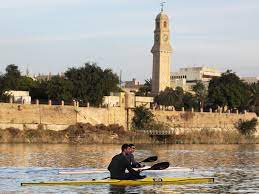


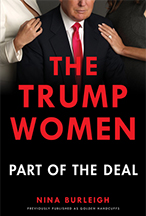
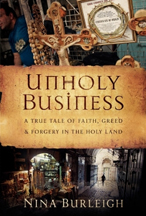
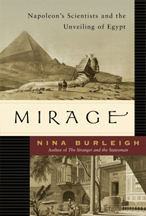

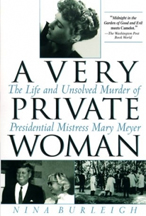
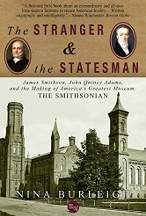
Leave a comment